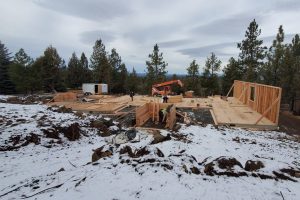Is it Better to Build in the Summer or Winter?
When it comes to construction projects, the timing of when to build can play a significant role in the overall success and efficiency of the project. One common question that arises is whether it’s better to undertake construction during the summer or winter months. Both seasons have their advantages and disadvantages, and understanding these factors can help project managers and homeowners make informed decisions. In this article, we will delve into the considerations surrounding building in the summer and winter, weighing the pros and cons of each season.
Advantages of Summer Construction
1. Favorable Weather Conditions
One of the most significant advantages of summer construction is the generally favorable weather conditions. With longer daylight hours, warmer temperatures, and less precipitation, construction projects can progress smoothly without as many weather-related delays. This is particularly beneficial for outdoor projects like roofing, concrete pouring, and exterior painting, which often require dry conditions to set and cure properly.

2. Efficient Workdays
The extended daylight hours during the summer months allow construction crews to work more efficiently and get more done in a single day. This can lead to faster project completion, reduced labor costs, and increased productivity. The ability to work longer hours also means that certain tasks can be accomplished in fewer days, minimizing disruptions to residents or business operations.
3. Faster Material Curing
Warmer temperatures can accelerate the curing and drying times of construction materials like concrete and mortar. This can significantly reduce the waiting time between different construction phases, leading to a quicker overall project timeline. Additionally, faster curing times can contribute to better quality outcomes as materials have less exposure to environmental elements that could compromise their integrity.
Considerations for Summer Construction
1. High Demand and Costs
The popularity of summer construction means that contractors and construction materials are in high demand. This can lead to increased costs for labor and materials due to supply and demand dynamics. It’s important for project planners to budget accordingly and secure contracts well in advance to ensure availability and reasonable pricing.
2. Heat and Humidity Challenges
While warmer temperatures can be advantageous, excessive heat and humidity can pose challenges for construction workers. High temperatures can lead to heat-related illnesses and reduced worker productivity. Proper safety measures, including hydration breaks and shaded rest areas, must be implemented to ensure the well-being of the construction crew.
Benefits of Winter Construction
1. Reduced Construction Costs

Winter is generally considered the off-season for construction, leading to reduced demand for both labor and materials. This can result in cost savings for project owners, as contractors may offer more competitive pricing to secure work during the slower months. Additionally, lower demand for materials can lead to discounts and promotions from suppliers.
2. Availability of Contractors
With fewer construction projects underway, contractors may have more availability during the winter months. This can lead to easier scheduling and coordination of construction activities, potentially resulting in faster project timelines.
3. Easier Permitting Process
During the summer, municipalities often experience a higher volume of construction permit applications. In contrast, the winter months typically see a decrease in permit requests, leading to a potentially smoother and faster permitting process for winter construction projects. For building a new home with citibuild construction read on.
Challenges of Winter Construction
1. Weather-Related Delays
Winter construction can be susceptible to weather-related delays, including snowstorms, freezing rain, and cold temperatures. These conditions can impact construction schedules and potentially lead to longer project timelines.
2. Limited Daylight Hours
The shorter daylight hours during the winter can restrict the amount of work that can be completed in a single day. This can lead to slower progress on construction projects, especially for tasks that require natural light.
3. Material Limitations
Cold temperatures can affect the performance of certain construction materials, such as concrete, which may have extended curing times or reduced strength development in cold weather. Special precautions and measures may need to be taken to ensure proper material performance.
Conclusion
The decision of whether to build in the summer or winter depends on various factors, including project timelines, budget constraints, and the specific challenges posed by each season. Summer construction offers the benefits of favorable weather conditions and efficient workdays, while winter construction can lead to reduced costs and increased contractor availability. Both seasons come with their own set of challenges, and careful planning and preparation are essential to ensure the success of any construction project, regardless of the chosen season. By weighing the advantages and disadvantages of each option, project managers and homeowners can make well-informed choices that align with their project goals and priorities.
Remember, whether it’s a scorching summer or a frosty winter, a successful construction project ultimately depends on proper planning, skilled craftsmanship, and effective project management.
